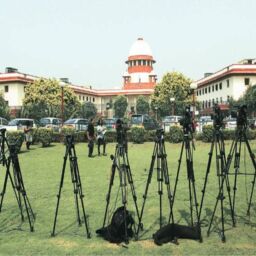INTRODUCTION
Ever since the Monsoon Session has convened on July 19, the parliament- both Lok Sabha and Rajya Sabha – has faced many disruptions to render it non-functional for most of the time that has passed since it has been convened. As per the sources, the parliament has been able to function for only 18 hours out of total 107 hours since it has been convened with Lok Sabha and Rajya Sabha being able to function only 7 hours out of possible 54 hours and 11 hours out of possible 53 hours respectively, thereby leading to a wastage of 89 hours of parliamentary working time and a loss of more than 133 crore of Taxpayers’ money[1]. In light of the above statistics, it is important to understand what are parliamentary disruptions, the motives behind them, their consequences and some measures to minimise the time and monetary loss arising from them.
PARLIAMENTARY DISRUPTIONS AND THEIR HISTORY
Parliamentary Disruption, in simple words, are the various tactics by which political parties mostly the opposition interrupts in the ordinary working of the parliament with the aim of disrupting the parliamentary processes and building pressure on the government. With successive government, the tendency to disrupt parliamentary working has been increasing, thereby leading to widespread outcry among the ordinary masses against its two major consequences namely waste of taxpayers’ money on constantly disrupted and consequently non-functional parliament and the legislative paralysis that it creates leading to problems in governance. The loss of time due to parliamentary disruptions has increased from below 10% during 10th Lok Sabha from 1991 to 1996 to more than 40% during 15th Lok Sabha from 2009 to 2014. Similar percentage of waste of time due to disruption has been observed in Rajya Sabha working only 66% of scheduled time[2].
The rise of parliamentary disruptions in Indian parliament has their own history. In the first two Lok Sabha (1952-62), the parliamentary proceedings were relatively disruption free and healthy discussions took place but with 3rd Lok Sabha the things started to change. Tempers frequently ran high, sometimes compelling speaker to suspend members for causing such disruptions, even calling Marshalls to escort suspended members. It was as soon as 1963 when some MPs disrupted parliamentary address by President Dr. Sarvepalli Radhakrishnan to both houses. After the general elections of 1967, when Congress came with reduced majority which further upped the tempo of disruptions by opposition. The situation did not change even when Congress went in opposition, a decade later with the disruption continuing. In the last 4 decades, such disruptions have become one of the most used tools of the opposition parties to build pressure on ruling parties and criticising such disruption when they themselves come in power. In 1998, when the Women’s Reservation Bill was presented in Lok Sabha, some MPs even snatched it from Speaker and tore him up. A similar disruptive act was witnessed in Rajya Sabha in 2010. The recent tearing up of the bill by a TMC MP shows the way in which parliamentary disruption have gained hard grounds in parliamentary proceedings.[3]
TYPES OF PARLIAMENTARY DISRUPTIONS
The various ways in which members of parliament engage in disrupting of parliamentary proceedings are as follows:
- Incessant shouting by members leading to frequent adjournments
- Rushing collectively towards the well of the house
- Tearing copies of Bills and other paperwork
- Bringing of various posters and placards along with other objects to protest.
- Sit-Ins and Dharnas inside house
- Well-Coordinated Walkouts from the house
- Boycott of particular meetings and sessions[4]
CAUSES OF PARLIAMENTARY DISRUPTIONS
The chief causes of Parliamentary Disruptions are as follows:
Substantive reasons for disruption:
- In the name of raising and discussing controversial matter relating to public importance, members frequently use the medium of disruption of parliament by making allegations and accusation on other members which ultimately lead to both the accusing member/s and accused members getting agitated.
- Parliamentary Disruptions are also caused by the opposition parties in order to gain greater publicity and visibility in public eyes as the debates of both houses are live telecasted and can be viewed by any member of public.
- Another reason for such disruptions is the tendency of privileging of political party over individual parliamentarians. The Anti Defection Law acts as one of the chief example of such privilegation as it act as suppressive barrier in freedom of dissenting of the member of party with its party commands. As a result, an individual parliamentarian could not display his disagreement with the disruption and instead is forced to participate to prove himself faithful to party line.
- Disruptions are also used by the ruling parties to evade responsibility and also to pass bills hastily. While the opposition parties are chief participants in such disruption and maximum disruption occur in Question hour and Zero hour, the ruling party may schedule such debates and discussions in such manner that maximum disruption take place so as to avoid responsibility and shift it on opposition. Such disruption are also used by ruling parties to hastily pass bills with the claim that opposition does not want discussion.
Structural Reasons of Disruption
- Disruptions are also caused when there is lack of adequate time allocated for discussion and raising questions and objections on unlisted matters. The rise in number of parties has also led to lesser time allocated to each party leading to discontent and disruptive tendency among them.
- The limited and scarce usage of disciplinary powers by Speaker and Chairperson of Lok Sabha and Rajya Sabha respectively is also another systematic reason for rising disruptive tendencies as the members involved do not have any deterrent to restrain from being involved in such acts.[5]
IMPLICATIONS AND CONSEQUENCES
- Loss and Wastage of Time of Parliamentary: Unnecessary and falsely motivated disruptions caused by the opposition leads to unnecessary wastage of precious time of Parliament which could be used for bringing out better policies. As per a PRS Legislative Reports, the frequent parliamentary disruptions, during 15th Lok Sabha (2009-2014), had led to wastage of 39% and 34% of scheduled time of Lok Sabha and Rajya Sabha respectively. In the ongoing monsoon session, the parliament has been able to work only 18 hours out of scheduled 107 hours in two weeks.
- Monetary Cost of Non-Functioning Parliament: The disruptions caused by the members of parliament also lead to wastage of hundreds of crores of hard earned taxpayers’ money. As per a 2008 discussion paper of Lok Sabha, it costs an average of Rs. 29000 to public exchequer for each minute of parliament. In the ongoing monsoon session as much as Rs. 133 crores have been wasted in two weeks due to such disruption.
- Opportunity Loss and Pending Bills: The unnecessary disruption lead to delay in passage of important laws of national importance and cost the country in terms of developmental opportunity loss.
- Poorly made and Ineffective Laws: The laws made in the session involving a lot of disruption in the parliament are passed hastily without a good amount of discussion and debate which affects its quality and effectiveness and as such remains poorly made and cost the country in terms of poor governance and administration.
- Cost of Missing Accountability and Transparency: The wastage of time due to frequent disruptions leads to lack of opportunity to question and raise objection due to no question hour and lack of debate on national issues, thus rendering ruling government with no responsibility and accountability for the decisions taken by them.[6]
MEASURES AND SOLUTIONS
Some of the measures that can be adopted to address and limit the tendency of disrupting the parliament are as follows:
- The discussion of controversial matters of public importance is important in parliament and for that there is a need to develop a better framework and a strategic restructuring for the discussions. The times allotted on such discussion also need to be increased so that all parties have the say in the discussions and no discontentment leading to disruptions takes place.
- Measures need to be taken to increase the accountability of the members of parliament engaging in parliamentary disruptions so as to dissuade them from using it as a means to gain public attention.
- Leaders and Members of all political parties should be given adequate opportunities to lead discussions and express their viewpoints before the houses so that they do not have to engage in disruptions.[7]
- Reforms in Anti-Defection law and promotion of inner democracy in the party should be taken so that individual members do not have to agree to all directions even if disruptive of their party’s high command and have freedom of dissent.
- Greater participation of opposition in business allocation of house would provide a check on such disruptions and ensure greater accountability.
- Stricter Measures need to be adopted by the Speaker and Chairperson of Lok Sabha and Rajya Sabha respectively so as to act as deterrent to members from involving in such disruptions.[8]
Author(s) Name: Shreyansh Rathi (Rajiv Gandhi National University of Law, Patiala)
References:
[1] Ajay Pandey, ‘The Politics of Parliamentary Disruption’ (Livemint, 24 August, 2015) <https://www.livemint.com/Opinion/Vf3anAosbfd9A6TJJiYFHL/The-politics-of-parliamentary-disruption.html> Accessed: 3 August, 2021
[2] Sreehari Aney, ‘Disruptions in Parliament’ (GovernanceNow, 6 January, 2020) <https://www.governancenow.com/news/regular-story/disruptions-in-parliament-common-perceptions-and-reality>Accessed: 4 August, 2021
[3] Chakshu Roy, ‘Regular Parliamentary Disruption has become Opposition’s Favoured Tool-At the cost of citizen’ (PRS India, 30 July, 2021) <https://prsindia.org/articles-by-prs-team/regular-parliament-disruption-has-become-opposition%E2%80%99s-favoured-tool%E2%80%94at-the-cost-of-citizen> Accessed 4 August, 2021
[4] Debu C, ‘Does Parliamentary Disruption represent true democracy?’ (MapsofIndia, 15 January, 2015) <https://www.mapsofindia.com/my-india/politics/does-parliamentary-disruption-represent-true-democracy> Accessed 4 August, 2021
[5] Yashaswini Mittal, Medha Srivastava, Kaushiki Sanyal, ‘Disruptions in the Indian Parliament’ (2016) Vidhi Centre for Legal Policy <https://vidhilegalpolicy.in/wp-content/uploads/2019/05/Report_DisruptionsintheIndianParliament_Vidhi1.pdf> Accessed 5 August, 2021
[6] Jatin Verma, ‘Parliamentary Disruptions’ (Jatinverma.org, 5 August, 2021) https://www.jatinverma.org/parliamentary-disruptions Accessed: 6 August, 2021
[7] Ravi Seth, ‘A Look at Parliament’s falling productivity and what can be done to make it work’ (Economic Times, 24 March, 2018) <https://economictimes.indiatimes.com/news/politics-and-nation/a-look-at-parliaments-falling-productivity-and-what-can-be-done-to-make-it-work/articleshow/63446061.cms> Accessed: 5 August, 2021
[8] Rakesh Kumar Barik, ‘Parliamentary Disruptions’ (Abhipedia) <https://abhipedia.abhimanu.com/Article/IAS/NDA0MwEEQQVVEEQQVV/Parliamentary-disruptions-Indian-Polity-IAS> Accessed: 6 August, 2021
















